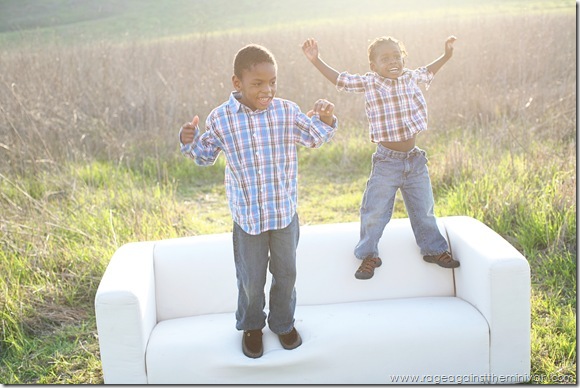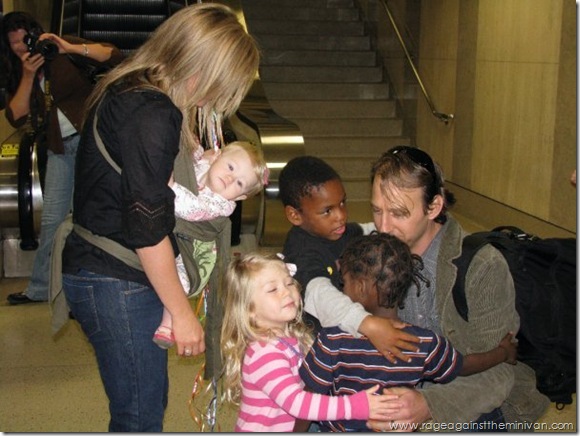It feels like so often, I write about specifics of our journey with Kembe just as issues are starting to resolve. I think it feels safer that way. Things are getting better, every day. He has become much more bonded to me in the last month. I can see him relaxing into our relationship with each day, and the constant testing is becoming less constant. I can see progress, even in the midst of challenge.
One of the things about Kembe’s homecoming that has been particularly hard has been his relationship with Jafta. So much of this struggle is based on unmet expectations, on my part and on Jafta’s. We waited for Kembe to come home for three years. Three years of Jafta knowing about him, visiting him in Haiti, and praying for him to come home every night. Kembe was a constant topic of conversation for Jafta. He talked about how much he loved him, how happy he was to be getting a brother, and how much he couldn’t wait for him to come home so they could play togehter. We all talked about it.
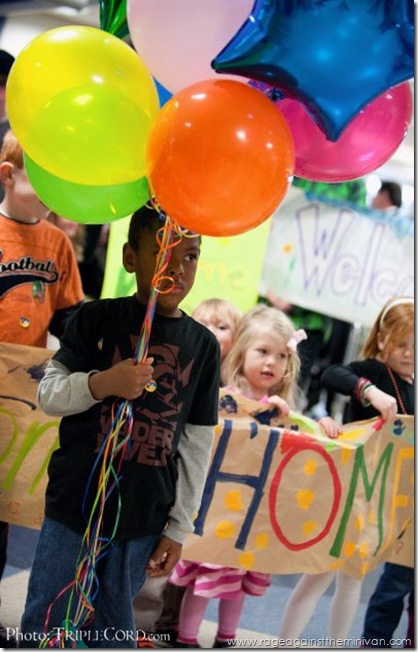
It is painful to admit that if I look back, Kembe never showed any reciprocal feelings towards Jafta during our visits. He was indifferent at best. Visits usually involved Jafta smothering Kembe for fifteen minutes, and then choosing to play with some of the older boys in the orphanage while Kembe ignored him. Kembe was rarely warm or friendly to Jafta. But we felt warm and friendly to him, and it went overlooked.
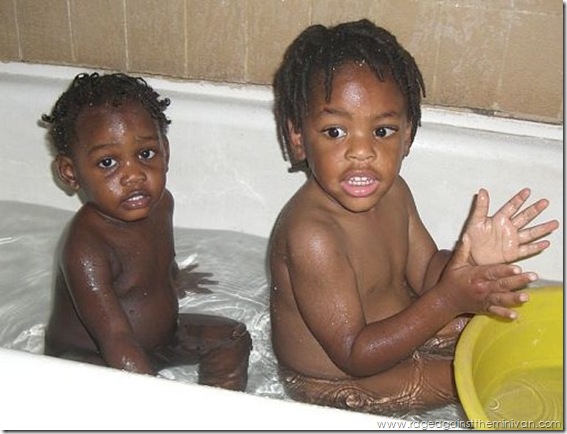
![brothers bathing[4] brothers bathing[4]](http://lh4.ggpht.com/_4tXcmFDX2W4/TJeJoSejkpI/AAAAAAAAEoI/J2YaBQm4HiA/brothersbathing42.jpg?imgmax=800)
When Kembe arrived home, Jafta was like a little puppy dog . . . following him everyone, just so happy to have him home. Kembe could do no wrong in his eyes. Kembe is a very strong personality, and in contrast, Jafta tends to be extremely loyal and even a bit passive. Kembe engaged with Jafta on two levels: he attempted to control him, or attempted to involve him in mischief. It’s my hunch that the boys at the orphanage had a habit of trying to see what they could get away with when the nannies weren’t looking, and that this was a source of entertainment for them. And really, isn’t this true of all kids? Except this seemed to be the only way Kembe attempted to connect with Jafta – in engaging him in troublemaking when I turned my back.
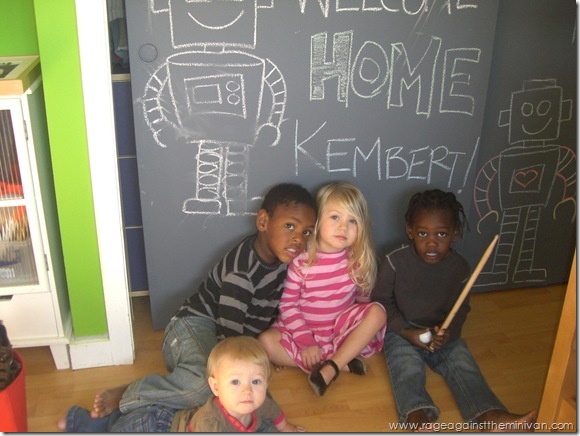
Jafta, being the ever-loyal follower that he is, was completely confused by this. He’s always been a pretty honest and compliant kid – but here is a new brother that he desperately wants acceptance from. And in big ways and small, Kembe spent several months in our home breaking whatever rules we set, and trying to get Jafta to be his accomplice. At one point, we got so sick of this dynamic that we stopped turning our backs on Kembe at all. He got such a thrill from trying to see what he could get away with when an adult stepped out of view. So we didn’t give him an opportunity. He is always under supervision now – and as exhausting as this kind of hover-craft parenting is, it is exactly what Kembe needs.
Anyways, back to Jafta: once we took away the “bonding over a common enemy” dynamic, Kembe and Jafta started fighting even more. Kembe really wanted to be alpha dog in the family, and for a long time Jafta was allowing it. But we saw his anger and frustreation building up, and in family therapy we were encouraged to help Jafta reclaim his space as the big brother. This was not easy. It is still not easy.
Kembe is a natural leader. It is crazy. We can go to a park, and five minutes later I might find Kembe (age three) in the middle of a football scrimmage with several junior-high boys, yelling at them about what the rules are. When the older boys on the block come over, he has them playing out of his pocket. Just tonight, we went to a neighborhood potluck and he got five school-aged girls to stand in a line and act as his cheerleaders every time he made a basket. I couldn’t decide whether to be proud or horrified. This kid is not lacking in confidence. He knows how to work a room. He has more street-smarts than the rest of us put together. And those dimples don’t hurt, either.
Jafta, on the other hand, is shy and socially awkward. He wears his heart on his sleeve and is easily defeated. He over-analyzes and worries. He is self-conscious and compares himself to others. In the park scene I described above? Jafta is sitting next to me pouting, because he is too nervous to go ask those older boys if he can play, and totally devstated that Kembe is now the darling of the group while he can’t even get up the nerve to go over there.
.
Then there is the competition factor. Jafta is clearly older and more mature in all the ways that would be important to a teacher, or a psychologist, or a parent. He has better impulse control and more empathy, and he shows great promise academically. But he’s also five, and so his measure of “successs” involves sports, peer acceptance, and trampoline skills. And I have to admit, Kembe excels at all of those things. Jafta sees it. And he hates it. Kembe sees it, and he gloats about it.
Ugh. It’s so painful to even write this out. I know that sibling rivalry is normal, and that we are not the first family (or the last) to have these issues. But it just seems so heartbreaking because Jafta had built up such expectations for what life would be like with a brother, and they have been crushed so terribly. Kembe’s rejection of Jafta has been very hard to watch.
Harder still, because Kembe absolutely adores his sisters. He dotes on Karis, following her around and making her laugh. They have such a cute relationship. And he and India really are like little twins. Their friendship is easy and enthusiastic. They just love being around each other and seem to have a natural connection, unhindered by competition because they don’t want to excel at the same things.
Fortunately, Jafta does have a best friend that he is very close with, and fortunately we have had some great guidance from a family therapist. We are working really hard to develop affection between our boys – even if that comes in the form of wrestling or playing football. We are trying to teach Jafta to be more assertive, and we are trying to teach Kembe to be less bossy and controlling. Most of all we are trying to show them both that they are deeply loved and special for who they are, and that they don’t need to compete for their place in our family . . . that there is room for both of them.
I’ve thought about writing about this for a while now, but it just seemed too personal and too difficult. But tonight, I saw a little spark of hope that things could be improving. There was a moment where they were remembering an exercise from their football camp this summer. They were trying to block each other, and laughing and falling, and then getting up and doing it again, and it just seemed like they were brothers. I realized I had taken for granted how much work has gone into cultivating affection between my all of my kids, and how naïve and unrealistic it was to expect Kembe to jump right in. I have definitely had to grieve and let go of the brothers I imagined they would be, and accept the strained yet budding relationship that they have. I am praying that in time, it will grow.
